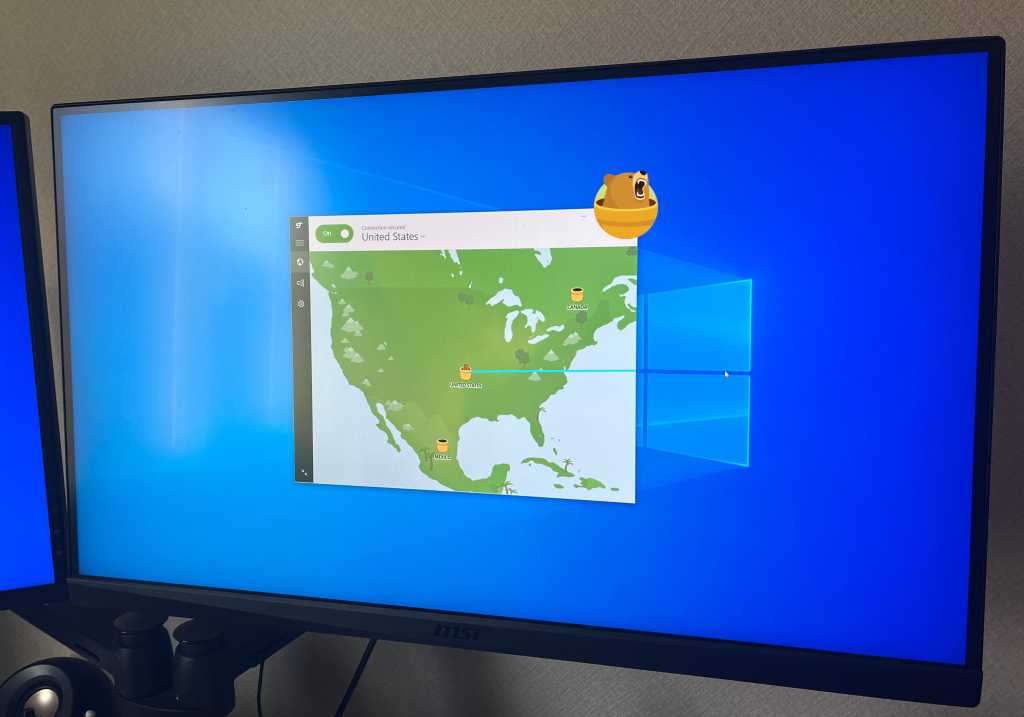Expert's Rating
Pros
- Charming and easy-to-use interface
- Multiple independent audits
- Unlimited simultaneous device connections
Cons
- Limited feature set
- Customer support not the most helpful
- Not a good option for torrenting
Our Verdict
TunnelBear is an undeniably charming VPN that keeps it simple with basic, but solid features. It offers reliable security, but continues to struggle with inConsistent speeds and unblocking issues. VPN novices will find it approachable, but advanced users will be left wanting more.
Price When Reviewed
This value will show the geolocated pricing text for product undefined
Best Pricing Today
TunnelBear is a good-humored VPN service owned by McAfee security company and based in Toronto, Canada. It’s been around for a while now and has always stood out due to its unique and endearing bear-themed interface.
The service has tried hard in recent years to remain relevant in an increasingly competitive VPN market by adding more features and maintaining a strong privacy record. Certainly there are ursine puns aplenty to be enjoyed here, but is the VPN service just right for you? I took it for a walk in the woods to find out.
Further reading: See our roundup of the best VPNs to learn about competing products.
TunnelBear in brief:
- P2P allowed: Yes
- Unlimited device connections: Yes
- Business location: Canada
- Number of servers: 8,000+
- Number of country locations: 47+
- Cost: $9.99 per month, $39.99 for 1 year, or $120 for 3 years
What are TunnelBear’s features and services?
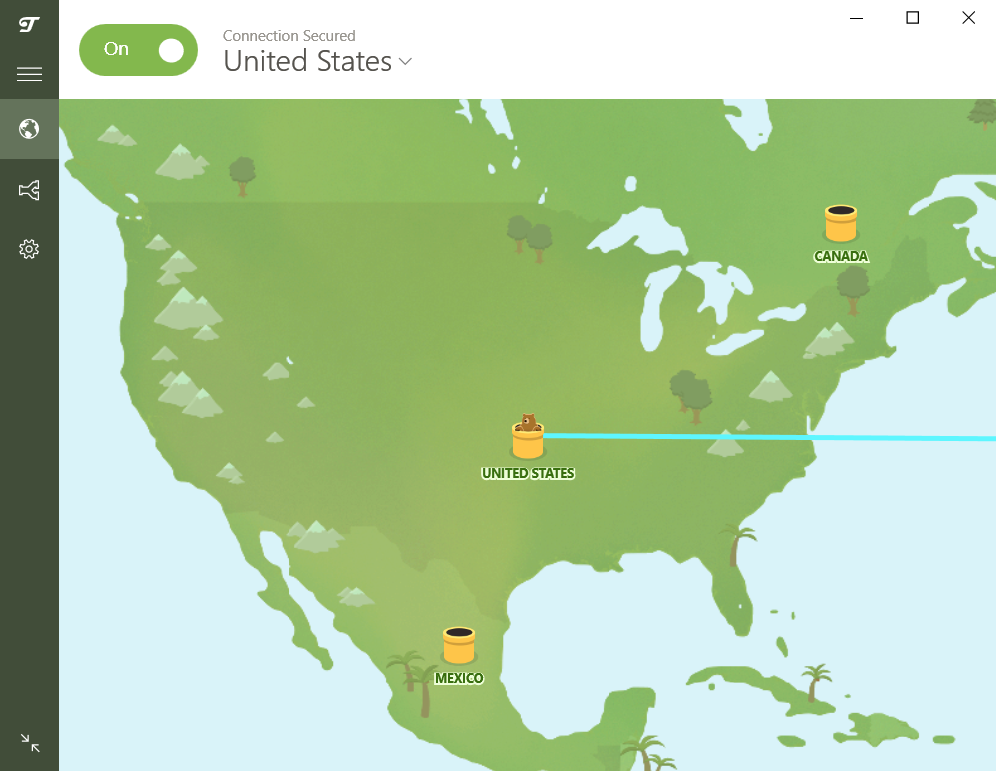
Sam Singleton
When you first open TunnelBear you can’t help but notice how much work the designers have put into it. The main interface is a world map geographically dotted with the available servers. As you scroll across the map, even the trees change based on the continent or region you’re viewing (palm trees in the Middle East, Umbrella Thorns in Africa). Your actual location is signified on the map with a sheep, but once you connect to the VPN it turns into a bear.
Each server location has an empty tunnel icon on it. To connect, just select the server location you want. In addition to selecting from a map, there is also a drop-down list at the top with all of the servers as well. Somehow in the TunnelBear universe sheeps turning into bears and bears digging through tunnels makes sense, but the logic is lost on me. Still, it’s a fun and unique design element.
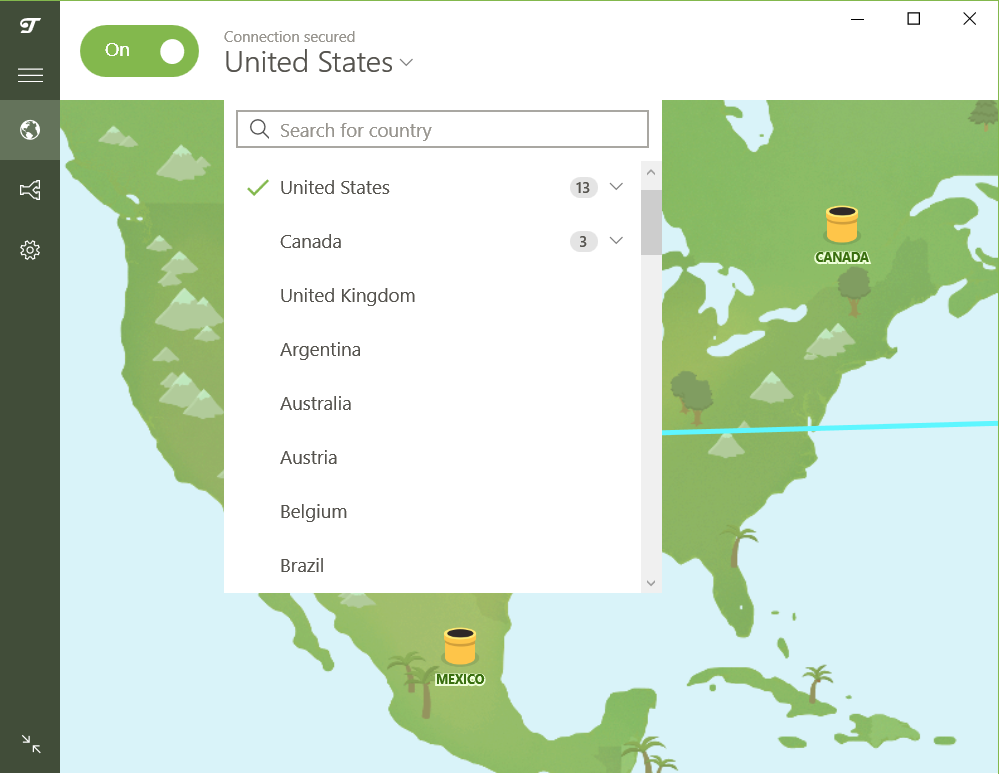
TunnelBear comes with a lot of servers, but not a wide variety of country locations.
Sam Singleton
TunnelBear offers unlimited simultaneous device connections with its premium subscription plan and comes with a large server network. While it boasts that it has over 8,000 servers, you wouldn’t necessarily know from looking at the server list on the app. Most of the 45 country locations, with the exceptions of the U.S. and Canada, only have one server to connect to. If you’re looking to stream and find the one server location in that country blocked, you’re essentially out of luck.
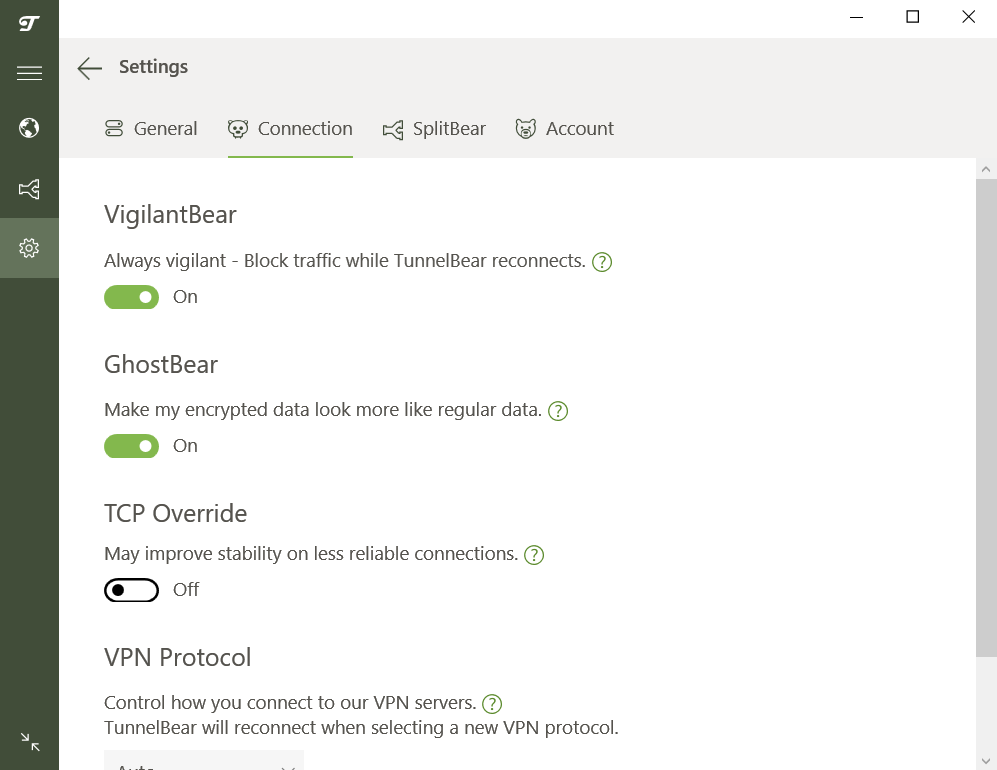
TunnelBear’s settings including a VigilantBear kill switch and GhostBear features.
Sam Singleton
On the whole, TunnelBear is a simple service without a lot of frills, but it does provide some interesting key features worth checking out. Along the side bar, under Settings > Security, TunnelBear has its own version of a kill switch feature called “VigilantBear.” It works a little differently than a normal kill switch in that instead of disconnecting your internet in the event of a VPN disconnection, it just blocks all incoming and outgoing traffic until the connection is re-established.
Additionally, TunnelBear offers a feature called “GhostBear” that makes your encrypted data less detectable. It does this by masking your VPN traffic and disguising it as HTTPS traffic which is generally less likely to be blocked by censors — particularly useful for streaming services such as Netflix.
By turning on the GhostBear feature, there is a higher likelihood that your connection will be able to access these restrictive sites. Be warned though, turning on GhostBear will likely slow down your connection even further.
TunnelBear offers a feature called ‘GhostBear’ that makes your encrypted data less detectable.
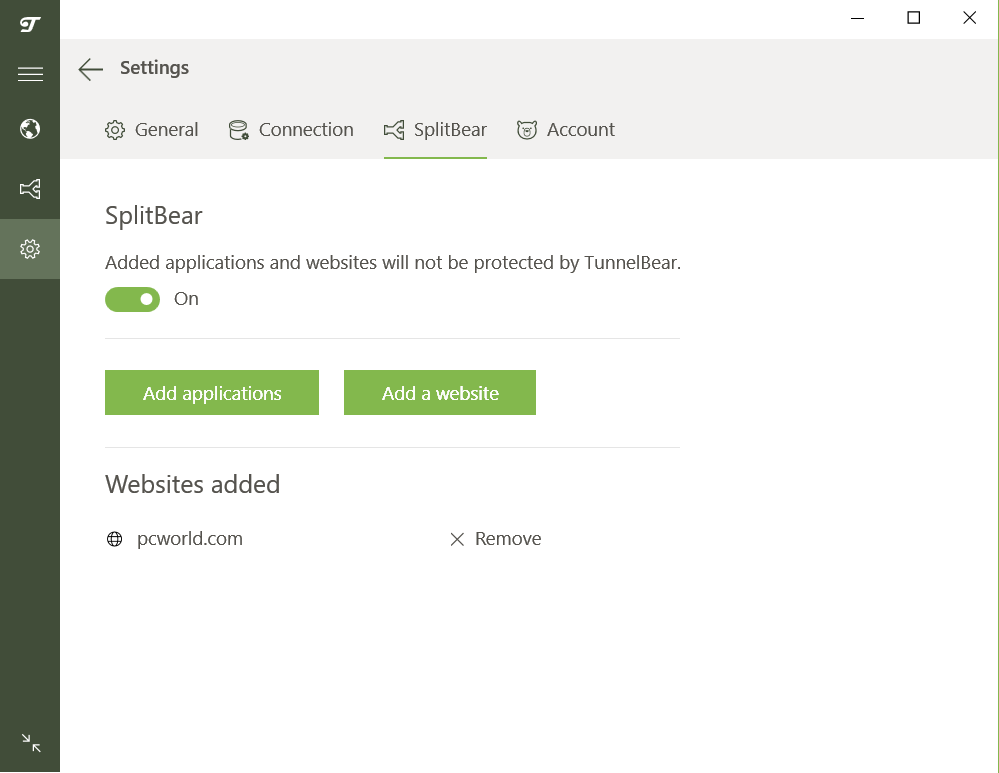
TunnelBear’s SplitBear feature allows you to pick and choose which apps and websites to run through the VPN and which to exclude.
Sam Singleton
Another feature to note is “SplitBear” or TunnelBear’s version of split-tunneling, which allows you to control which apps or websites will have access to the VPN connection. Unfortunately, TunnelBear lacks many advanced features that competitors offer such as multi-hop and dedicated servers specific to certain activities — streaming, torrenting, etc.
In fact, in the past, TunnelBear had blocked access to P2P downloads but has reversed course and begun allowing them. Still, it’s not something that it openly encourages with its service and for that reason other VPN providers such as ProtonVPN and Mullvad VPN are better suited for torrenting.
TunnelBear offers desktop programs and mobile apps for a number of systems such as Mac, Windows, Android, and iOS. There are also browser extensions for Firefox, Chrome, and Edge.
How much does TunnelBear cost?
TunnelBear offers its premium “Unlimited” plan in monthly, 1-year, or 3-year increments. If you opt for the monthly plan you’ll need to pony up $9.99 per month. The 1-year plan will set you back $39.99 for the first year or $3.33 per month. Then there’s the 3-year plan which runs for $120 or $3.33 per month. It’s worth noting that with the 1-year plan, the rate will auto-renew at $59.88 per year for any subsequent years you subscribe.
While these certainly aren’t the most expensive prices I’ve seen for a premium VPN service, they aren’t the cheapest either. The monthly plan in particular strikes me as a bit expensive for the rather small feature set that TunnelBear provides. Other similar services offer multi-hop and ad- and tracker-blocking for the same prices. When it comes to the longer-term plans, the price becomes much more reasonable.
Personally, I don’t recommend anyone opt for a 3-year plan as the ever-changing landscape of the VPN market makes this too long of a commitment. If you want to save some money and enjoy TunnelBear then stick with the 1-year plan instead and reassess the service each year.
TunnelBear does also offer a free plan which includes full access to the TunnelBear VPN service with all of its servers and features. The drawback is that you’re limited to 2GB of data per month. With a data limit that low, it’s hard to recommend using the free plan for anything other than testing out the service before deciding to upgrade.
TunnelBear accepts payments via credit card only.
How is TunnelBear’s performance?

Tunnelbear
During my testing I rated speeds across TunnelBear’s servers in six different countries all around the world and then compared them to my baseline internet speed. Last time around, TunnelBear’s server speeds weren’t great, and this time wasn’t much better. Across all locations tested, the speeds averaged a mere 40 percent of the base download speed and an even less impressive 35 percent of the base upload speed. Not only do these numbers not impress, but they fell way short of the services in our top five fastest VPNs.
Still, online speeds can vary wildly in pure Mbps tests from day to day and even hour to hour. It’s best to take any and all speed tests with a grain of salt. Your experience with TunnelBear may differ from those in the tests for this review.
In regards to streaming, I noticed that TunnelBear wasn’t able to consistently unblock sites such as Netflix and Amazon Prime. It was successful most of the time but the odd server seemed to have trouble or was outright being blocked. I found similar results in the past with TunnelBear and the lack of improvement in this area feels a bit careless.
When I turned on the GhostBear feature it seemed to solve most of these unblocking issues. Unfortunately, with GhostBear turned on, I noticed that my connection speeds plummeted and I wasn’t able to stream HQ video because it was too slow. So GhostBear seems to work as intended, but it wasn’t really a viable solution for streaming.
Given these results, I personally wouldn’t recommend TunnelBear as a reliable VPN for streaming. That doesn’t mean it can’t be used to stream, but I believe there are better options available. Competitors such as NordVPN, which works flawlessly with Netflix, or CyberGhost VPN, which has a ton of locations to choose from and optimized servers for streaming, would be the preferred alternatives. (See my roundup of the best VPNs for streaming Netflix to learn more.)
How is TunnelBear’s security and privacy?
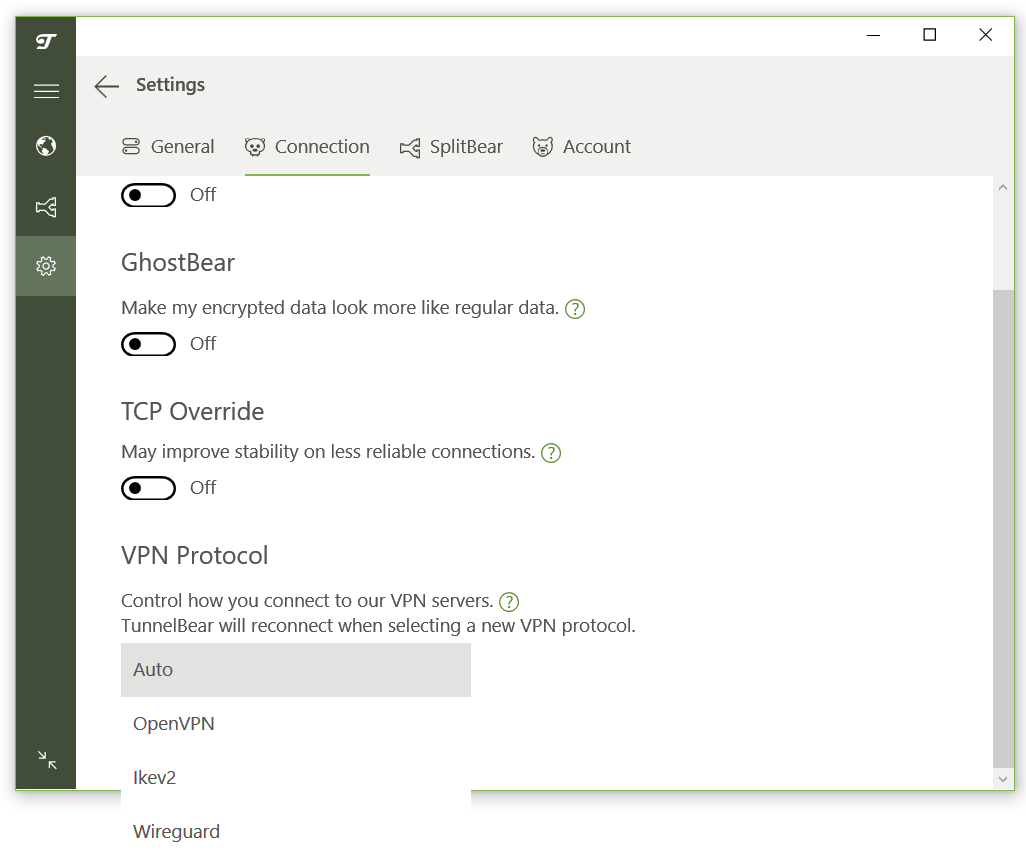
TunnelBear’s protocol options for its Windows app.
Sam Singleton
TunnelBear comes with your industry standard AES-256 encryption, which is the strongest currently available. The WireGuard and OpenVPN protocols are supported on all platforms while IKEv2 is available for Windows users as well.
Since TunnelBear began supporting WireGuard last year, it is the protocol I recommend for most activities due to its strong security and speeds. But, if you’re unsure, you can just select the “Auto” option in TunnelBear’s settings and the app will choose what it believes is the best protocol for your connection.
Also, in order to confirm that my actual IP address is obfuscated correctly, I used a DNS leak test. It confirmed that there were no issues with accidental leaks of my IP address when connected to TunnelBear’s servers.
According to its privacy policy, TunnelBear does not collect any DNS queries, IP addresses of users, timestamps, or other personal identifiable information. However, it does collect what it deems “operational data” such as user support and troubleshooting queries, total data used per month, and some sales data. It says that none of this information could identify users and are “not related to the time and activity of VPN usage.”
TunnelBear continues to conduct regular third-party audits by Cure53, a trustworthy and reliable Big Four auditing firm. It has successfully passed every audit for the last seven years. That’s admirable and should be a big selling point for privacy conscious users.
TunnelBear itself is located in Toronto, Canada, which means that all personal information is handled according to Canadian law. While Canada does not currently have any mandatory data retention laws, they are a member of the Five Eyes intelligence-sharing alliance, meaning they could be obligated to share user data with other governments. Fortunately, TunnelBear’s verified no-logs policy means it wouldn’t have any user data to turn over anyway.
Is TunnelBear worth it?
TunnelBear is a VPN that sticks to the basics — privacy and bear puns. Most of its appeal comes from its charm and simplicity. It’s extremely easy to use, not overwhelming you with too many features or country options. And while this might be ideal for the average user, power users who like to tweak and optimize their VPN connections will feel that the service doesn’t offer enough to satisfy their needs.
The speeds are passable, but not great — you might say they lumber a bit. Also, I did encounter some unfortunate issues with servers being unable to unblock streaming platforms, particularly Netflix. Overall, this approachable and cheerful service is a good option for users who are just getting started with VPNs or might not be the most tech-savvy. Otherwise, there are other services such as those on our best VPNs list that might be better for more advanced users.
Editor’s note: Because online services are often iterative, gaining new features and performance improvements over time, this review is subject to change in order to accurately reflect the current state of the service. Any changes to text or our final review verdict will be noted at the top of this article.

